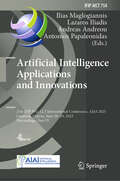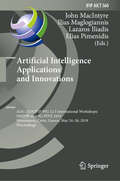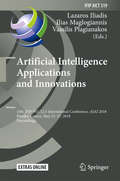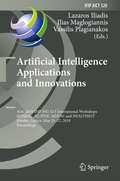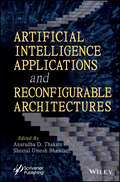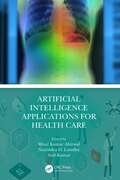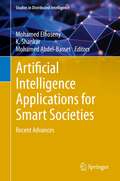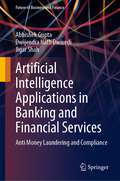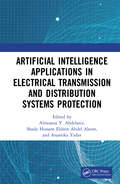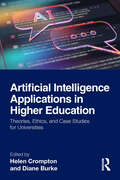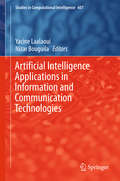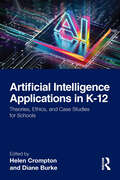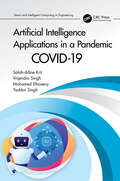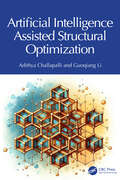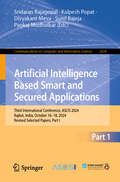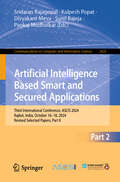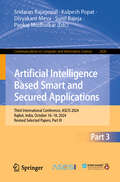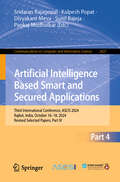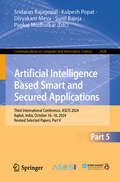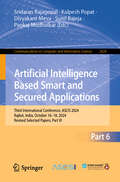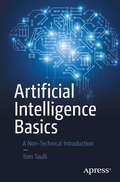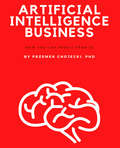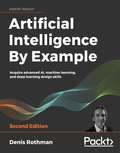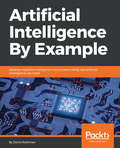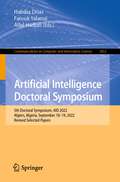- Table View
- List View
Artificial Intelligence Applications and Innovations: 21st IFIP WG 12.5 International Conference, AIAI 2025, Limassol, Cyprus, June 26–29, 2025, Proceedings, Part IV (IFIP Advances in Information and Communication Technology #758)
by Lazaros Iliadis Ilias Maglogiannis Antonios Papaleonidas Andreas AndreouThis four-volume set constitutes the proceedings of the 21st IFIP WG 12.5 International Conference on Artificial Intelligence Applications and Innovations, AIAI 2025, which was held in Limassol, Cyprus, during June 2025. The 123 full papers and 7 short papers were presented in this volume were carefully reviewed and selected from 303 submissions. They focus on ethical-moral AI aspects related to its Environmental impact, Privacy, Transparency, Bias, Discrimination and Fairness.
Artificial Intelligence Applications and Innovations: AIAI 2019 IFIP WG 12.5 International Workshops: MHDW and 5G-PINE 2019, Hersonissos, Crete, Greece, May 24–26, 2019, Proceedings (IFIP Advances in Information and Communication Technology #560)
by Elias Pimenidis Lazaros Iliadis Ilias Maglogiannis John MacIntyreThis book constitutes the refereed proceedings of two International Workshops held as parallel events of the 15th IFIP WG 12.5 International Conference on Artificial Intelligence Applications and Innovations, AIAI 2019, in Hersonissos, Crete, Greece, in May 2019: the 8th Mining Humanistic Data Workshop, MHDW 2019, and the 4th Workshop on 5G-Putting Intelligence to the Network Edge, 5G-PINE 2019.The 6 full papers and 4 short papers presented at MHDW 2019 were carefully reviewed and selected from 13 submissions; out of the 14 papers submitted to 5G-PINE 2019, 6 were accepted as full papers and 1 as short paper. The MHDW papers focus on the application of innovative as well as existing data matching, fusion and mining and knowledge discovery and management techniques (such as decision rules, decision trees, association rules, ontologies and alignments, clustering, filtering, learning, classifier systems, neural networks, support vector machines, preprocessing, post processing, feature selection, visualization techniques) to data derived from all areas of humanistic sciences, e.g., linguistic, historical, behavioral, psychological, artistic, musical, educational, social, and ubiquitous computing and bioinformatics. The papers presented at 5G-PINE focus on several innovative findings coming directly from modern European research in the area of modern 5G telecommunications infrastructures and related innovative services and cover a wide variety of technical and business aspects promoting options for growth and development.
Artificial Intelligence Applications and Innovations: Aiai 2018 Ifip Wg 12. 5 International Workshops, Sedseal, 5g-pine, Mhdw, And Healthiot, Rhodes, Greece, May 25-27, 2018, Proceedings (IFIP Advances in Information and Communication Technology #520)
by Lazaros Iliadis Ilias Maglogiannis Vassilis PlagianakosThis book constitutes the refereed proceedings of the 14th IFIP WG 12.5 International Conference on Artificial Intelligence Applications and Innovations, AIAI 2018, held in Rhodes, Greece, in May 2018.The 42 full papers and 12 short papers were carefully reviewed and selected from 88 submissions. They are organized in the following topical sections: social media, games, ontologies; deep learning; support vector machines; constraints; machine learning, regression, classification; neural networks; medical intelligence; recommender systems; optimization; learning, intelligence; heuristic approaches, cloud; fuzzy; and human and computer interaction, sound, video, processing.
Artificial Intelligence Applications and Innovations: Aiai 2018 Ifip Wg 12. 5 International Workshops, Sedseal, 5g-pine, Mhdw, And Healthiot, Rhodes, Greece, May 25-27, 2018, Proceedings (IFIP Advances in Information and Communication Technology #520)
by Lazaros Iliadis Ilias Maglogiannis Vassilis PlagianakosThis book constitutes the refereed proceedings of 4 workshops held at the 14th IFIP WG 12.5 International Conference on Artificial Intelligence Applications and Innovations, AIAI 2018, held in Rhodes, Greece, in May 2018. The workshops were the Workshop on Semantics in the Deep: Semantic Analytics for Big Data, SEDSEAL 2018; the Third Workshop on 5G - Putting Intelligence to the Network Edge, 5G-PINE 2018; the 7th Mining Humanistic Data Workshop, MHDW 2018; and the Workshop on Intelligent Cloud and IOT Paradigms in EHealth, HEALTHIOT 2018.The 19 full papers and 5 short papers presented were carefully reviewed and selected from a total of 53 submissions: SEDSEAL accepted 2 full papers out of 5 submissions, 5G-PINE 6 full and one short paper out of 24, MHDW 7 full and 4 short papers out of 15, and HEALTHIOT 4 full papers out of 9. The papers cover topics such as AI in 5G and telecommunications, AI and e-health services, AI in 5G networks, incremental learning, clustering, AI in text mining, visual data analytics, AI in molecular biology, DNA, RNA, proteins, big data analytics, Internet of Things and recommender systems, and AI in biomedical applications.
Artificial Intelligence Applications and Reconfigurable Architectures
by Anuradha D. Thakare Sheetal Umesh BhandariARTIFICIAL INTELLIGENCE APPLICATIONS and RECONFIGURABLE ARCHITECTURES The primary goal of this book is to present the design, implementation, and performance issues of AI applications and the suitability of the FPGA platform. This book covers the features of modern Field Programmable Gate Arrays (FPGA) devices, design techniques, and successful implementations pertaining to AI applications. It describes various hardware options available for AI applications, key advantages of FPGAs, and contemporary FPGA ICs with software support. The focus is on exploiting parallelism offered by FPGA to meet heavy computation requirements of AI as complete hardware implementation or customized hardware accelerators. This is a comprehensive textbook on the subject covering a broad array of topics like technological platforms for the implementation of AI, capabilities of FPGA, suppliers’ software tools and hardware boards, and discussion of implementations done by researchers to encourage the AI community to use and experiment with FPGA. Readers will benefit from reading this book because It serves all levels of students and researcher’s as it deals with the basics and minute details of Ecosystem Development Requirements for Intelligent applications with reconfigurable architectures whereas current competitors’ books are more suitable for understanding only reconfigurable architectures. It focuses on all aspects of machine learning accelerators for the design and development of intelligent applications and not on a single perspective such as only on reconfigurable architectures for IoT applications. It is the best solution for researchers to understand how to design and develop various AI, deep learning, and machine learning applications on the FPGA platform. It is the best solution for all types of learners to get complete knowledge of why reconfigurable architectures are important for implementing AI-ML applications with heavy computations. Audience Researchers, industrial experts, scientists, and postgraduate students who are working in the fields of computer engineering, electronics, and electrical engineering, especially those specializing in VLSI and embedded systems, FPGA, artificial intelligence, Internet of Things, and related multidisciplinary projects.
Artificial Intelligence Applications for Health Care
by Anil Kumar Mitul Kumar Ahirwal Narendra D. LondheThis book takes an interdisciplinary approach by covering topics on health care and artificial intelligence. Data sets related to biomedical signals (ECG, EEG, EMG) and images (X-rays, MRI, CT) are explored, analyzed, and processed through different computation intelligence methods. Applications of computational intelligence techniques like artificial and deep neural networks, swarm optimization, expert systems, decision support systems, clustering, and classification techniques on medial datasets are explained. Survey of medical signals, medial images, and computation intelligence methods are also provided in this book. Key Features Covers computational Intelligence techniques like artificial neural networks, deep neural networks, and optimization algorithms for Healthcare systems Provides easy understanding for concepts like signal and image filtering techniques Includes discussion over data preprocessing and classification problems Details studies with medical signal (ECG, EEG, EMG) and image (X-ray, FMRI, CT) datasets Describes evolution parameters such as accuracy, precision, and recall etc. This book is aimed at researchers and graduate students in medical signal and image processing, machine and deep learning, and healthcare technologies.
Artificial Intelligence Applications for Smart Societies: Recent Advances (Studies in Distributed Intelligence)
by Mohamed Elhoseny K. Shankar Mohamed Abdel-BassetThis volume discusses recent advances in Artificial Intelligence (AI) applications in smart, internet-connected societies, highlighting three key focus areas. The first focus is on intelligent sensing applications. This section details the integration of Wireless Sensing Networks (WSN) and the use of intelligent platforms for WSN applications in urban infrastructures, and discusses AI techniques on hardware and software systems such as machine learning, pattern recognition, expert systems, neural networks, genetic algorithms, and intelligent control in transportation and communications systems. The second focus is on AI-based Internet of Things (IoT) systems, which addresses applications in traffic management, medical health, smart homes and energy. Readers will also learn about how AI can extract useful information from Big Data in IoT systems. The third focus is on crowdsourcing (CS) and computing for smart cities. this section discusses how CS via GPS devices, GIS tools, traffic cameras, smart cards, smart phones and road deceleration devices enables citizens to collect and share data to make cities smart, and how these data can be applied to address urban issues including pollution, traffic congestion, public safety and increased energy consumption. This book will of interest to academics, researchers and students studying AI, cloud computing, IoT and crowdsourcing in urban applications.
Artificial Intelligence Applications in Banking and Financial Services: Anti Money Laundering and Compliance (Future of Business and Finance)
by Abhishek Gupta Dwijendra Nath Dwivedi Jigar ShahThis book discusses all aspects of money laundering, starting from traditional approach to financial crimes to artificial intelligence-enabled solutions. It also discusses the regulators approach to curb financial crimes and how syndication among financial institutions can create a robust ecosystem for monitoring and managing financial crimes. It opens with an introduction to financial crimes for a financial institution, the context of financial crimes, and its various participants. Various types of money laundering, terrorist financing, and dealing with watch list entities are also part of the discussion. Through its twelve chapters, the book provides an overview of ways in which financial institutions deal with financial crimes; various IT solutions for monitoring and managing financial crimes; data organization and governance in the financial crimes context; machine learning and artificial intelligence (AI) in financial crimes; customer-level transaction monitoring system; machine learning-driven alert optimization; AML investigation; bias and ethical pitfalls in machine learning; and enterprise-level AI-driven Financial Crime Investigation (FCI) unit. There is also an Appendix which contains a detailed review of various data sciences approaches that are popular among practitioners.The book discusses each topic through real-life experiences. It also leverages the experience of Chief Compliance Officers of some large organizations to showcase real challenges that heads of large organizations face while dealing with this sensitive topic. It thus delivers a hands-on guide for setting up, managing, and transforming into a best-in-class financial crimes management unit. It is thus an invaluable resource for researchers, students, corporates, and industry watchers alike.
Artificial Intelligence Applications in Electrical Transmission and Distribution Systems Protection
by Almoataz Y. AbdelazizArtificial intelligence (AI) can successfully help in solving real-world problems in power transmission and distribution systems because AI-based schemes are fast, adaptive, and robust and are applicable without any knowledge of the system parameters. This book considers the application of AI methods for the protection of different types and topologies of transmission and distribution lines. It explains the latest pattern-recognition-based methods as applicable to detection, classification, and location of a fault in the transmission and distribution lines, and to manage smart power systems including all the pertinent aspects. FEATURES Provides essential insight on uses of different AI techniques for pattern recognition, classification, prediction, and estimation, exclusive to power system protection issues Presents an introduction to enhanced electricity system analysis using decision-making tools Covers AI applications in different protective relaying functions Discusses issues and challenges in the protection of transmission and distribution systems Includes a dedicated chapter on case studies and applications This book is aimed at graduate students, researchers, and professionals in electrical power system protection, stability, and smart grids.
Artificial Intelligence Applications in Higher Education: Theories, Ethics, and Case Studies for Universities
by Diane Burke Helen CromptonArtificial Intelligence Applications in Higher Education offers direct examples of how artificial intelligence systems can be applied in today’s higher education contexts. As the use of AI rapidly advances within colleges and universities worldwide, there is a pressing need to showcase the challenges, opportunities, and ethical considerations that are inherent in deploying these advanced computational tools. This book highlights the multifaceted roles of AI across teaching and learning, institutional administration, student data management, and beyond. Its collected case studies furnish actionable insights into enhancing academic institutions and addressing diverse learning priorities, such as motivation, engagement, feedback, and achievement goals. This valuable reference for researchers, designers, administrators, teaching faculty, and graduate students across various university programs offers fresh perspectives on generative AI, adaptive learning, intelligent tutoring systems, chatbots, predictive technologies, remote learning, and more.
Artificial Intelligence Applications in Information and Communication Technologies (Studies in Computational Intelligence #607)
by Yacine Laalaoui Nizar BouguilaThis book presents various recent applications of Artificial Intelligence in Information and Communication Technologies such as Search and Optimization methods, Machine Learning, Data Representation and Ontologies, and Multi-agent Systems. The main aim of this book is to help Information and Communication Technologies (ICT) practitioners in managing efficiently their platforms using AI tools and methods and to provide them with sufficient Artificial Intelligence background to deal with real-life problems.
Artificial Intelligence Applications in K-12: Theories, Ethics, and Case Studies for Schools
by Diane Burke Helen CromptonArtificial Intelligence Applications in K-12 offers authentic instances of how AI systems can be integrated into K-12 education today. As AI technologies rapidly evolve and become more accessible to primary, middle, and high schools worldwide, there is a pressing need for new demonstrations that highlight the challenges, opportunities, and ethical considerations associated with these powerful tools. This book explores the various roles of AI within pedagogy and assessment, school administration, student data management, and beyond. Its collected case studies present practical ideas for enhancing educational institutions and offer replicable approaches across a range of learning priorities, from fostering motivation and engagement to improving feedback and achieving educational goals. Researchers, faculty members of teacher and leadership preparation programs, curriculum and instruction specialists, school-based instructional designers, technology coaches, and other readers will gain fresh insights from diverse global perspectives on topics such as generative AI, adaptive learning, intelligent tutoring systems, chatbots, predictive technologies, facial recognition software, and more.
Artificial Intelligence Applications in a Pandemic: COVID-19 (Smart and Intelligent Computing in Engineering)
by Salah-Ddine KritCOVID-19, a novel coronavirus pandemic has disrupted our society in many ways. Digital healthcare innovations are required more than ever before as we come across myriad challenges during this pandemic. Scientists and developers are learning and finding a way to use artificial intelligence applications and natural language processing to comprehend and tackle this disease. AI technologies are playing an important role in the response to the COVID-19 pandemic. Experts are using all possible tools to study the virus, diagnose individuals, and analyze the public health impacts. This book is a collection of some of the leading efforts related to AI and COVID-19 focused on finding how AI can be helpful in monitoring the situation from early warnings, swift emergency responses, and critical decision-making. It discusses the use of machine learning and how it may help to reduce the impacts of this pandemic in conjunction with all other research and strategies going on. The book serves as a technical resource of data analytics and AI applications in tracking infectious diseases. It will serve academics, students, data scientists, medical practitioners, and anybody managing a global pandemic. Features: Directs the attention to the smart digital healthcare system in this COVID-19 pandemic. Simulates novel investigations and how they will be beneficial in understanding the pandemic. Presents the latest ideas developed for data scientists, doctors, engineers, and economists. Analyses the various issues related to computing, AI apps, big data analytic techniques, and predictive scientific skill gaps. Explains some interesting and diverse types of challenges and data-driven healthcare applications.
Artificial Intelligence Assisted Structural Optimization
by Adithya Challapalli Guoqiang LiArtificial Intelligence Assisted Structural Optimization explores the use of machine learning and correlation analysis within the forward design and inverse design frameworks to design and optimize lightweight load-bearing structures as well as mechanical metamaterials.Discussing both machine learning and design analysis in detail, this book enables readers to optimize their designs using a data-driven approach. This book discusses the basics of the materials utilized, for example, shape memory polymers, and the manufacturing approach employed, such as 3D or 4D printing. Additionally, the book discusses the use of forward design and inverse design frameworks to discover novel lattice unit cells and thin-walled cellular unit cells with enhanced mechanical and functional properties such as increased mechanical strength, heightened natural frequency, strengthened impact tolerance, and improved recovery stress. Inverse design methodologies using generative adversarial networks are proposed to further investigate and improve these structures. Detailed discussions on fingerprinting approaches, machine learning models, structure screening techniques, and typical Python codes are provided in the book.The book provides detailed guidance for both students and industry engineers to optimize their structural designs using machine learning.
Artificial Intelligence Based Smart and Secured Applications: Third International Conference, ASCIS 2024, Rajkot, India, October 16–18, 2024, Revised Selected Papers, Part I (Communications in Computer and Information Science #2424)
by Sridaran Rajagopal Kalpesh Popat Divyakant Meva Sunil Bajeja Pankaj MudholkarThe six-volume set, CCIS 2424 - 2429, constitutes the refereed proceedings of the Third International Conference on Advances in Smart Computing and Information Security, ASCIS 2024, held in Rajkot, Gujarat, India, in October 16–18, 2024. The 138 full papers and 43 short papers presented in these six volumes were carefully reviewed and selected from 667 submissions.The papers presented in these six volumes are organized in the following topical sections: Part I, II, III, IV: Artificial Intelligence & Machine Learning Part V: Smart Computing; Network and Cloud Computing. Part VI: Cyber Security; Computer Application for Sustainability.
Artificial Intelligence Based Smart and Secured Applications: Third International Conference, ASCIS 2024, Rajkot, India, October 16–18, 2024, Revised Selected Papers, Part II (Communications in Computer and Information Science #2425)
by Sridaran Rajagopal Kalpesh Popat Divyakant Meva Sunil Bajeja Pankaj MudholkarThe six-volume set, CCIS 2424 - 2429, constitutes the refereed proceedings of the Third International Conference on Advances in Smart Computing and Information Security, ASCIS 2024, held in Rajkot, Gujarat, India, in October 16–18, 2024. The 138 full papers and 43 short papers presented in these six volumes were carefully reviewed and selected from 667 submissions.The papers presented in these six volumes are organized in the following topical sections: Part I, II, III, IV: Artificial Intelligence & Machine Learning Part V: Smart Computing; Network and Cloud Computing. Part VI: Cyber Security; Computer Application for Sustainability.
Artificial Intelligence Based Smart and Secured Applications: Third International Conference, ASCIS 2024, Rajkot, India, October 16–18, 2024, Revised Selected Papers, Part III (Communications in Computer and Information Science #2426)
by Sridaran Rajagopal Kalpesh Popat Divyakant Meva Sunil Bajeja Pankaj MudholkarThe six-volume set, CCIS 2424 - 2429, constitutes the refereed proceedings of the Third International Conference on Advances in Smart Computing and Information Security, ASCIS 2024, held in Rajkot, Gujarat, India, in October 16–18, 2024. The 138 full papers and 43 short papers presented in these six volumes were carefully reviewed and selected from 667 submissions.The papers presented in these six volumes are organized in the following topical sections: Part I, II, III, IV: Artificial Intelligence & Machine Learning Part V: Smart Computing; Network and Cloud Computing. Part VI: Cyber Security; Computer Application for Sustainability.
Artificial Intelligence Based Smart and Secured Applications: Third International Conference, ASCIS 2024, Rajkot, India, October 16–18, 2024, Revised Selected Papers, Part IV (Communications in Computer and Information Science #2427)
by Sridaran Rajagopal Kalpesh Popat Divyakant Meva Sunil Bajeja Pankaj MudholkarThe six-volume set, CCIS 2424 - 2429, constitutes the refereed proceedings of the Third International Conference on Advances in Smart Computing and Information Security, ASCIS 2024, held in Rajkot, Gujarat, India, in October 16–18, 2024. The 138 full papers and 43 short papers presented in these six volumes were carefully reviewed and selected from 667 submissions.The papers presented in these six volumes are organized in the following topical sections: Part I, II, III, IV: Artificial Intelligence & Machine Learning Part V: Smart Computing; Network and Cloud Computing. Part VI: Cyber Security; Computer Application for Sustainability.
Artificial Intelligence Based Smart and Secured Applications: Third International Conference, ASCIS 2024, Rajkot, India, October 16–18, 2024, Revised Selected Papers, Part V (Communications in Computer and Information Science #2428)
by Sridaran Rajagopal Kalpesh Popat Divyakant Meva Sunil Bajeja Pankaj MudholkarThe six-volume set, CCIS 2424 - 2429, constitutes the refereed proceedings of the Third International Conference on Advances in Smart Computing and Information Security, ASCIS 2024, held in Rajkot, Gujarat, India, in October 16–18, 2024. The 138 full papers and 43 short papers presented in these six volumes were carefully reviewed and selected from 667 submissions.The papers presented in these six volumes are organized in the following topical sections: Part I, II, III, IV: Artificial Intelligence & Machine Learning Part V: Smart Computing; Network and Cloud Computing. Part VI: Cyber Security; Computer Application for Sustainability.
Artificial Intelligence Based Smart and Secured Applications: Third International Conference, ASCIS 2024, Rajkot, India, October 16–18, 2024, Revised Selected Papers, Part VI (Communications in Computer and Information Science #2429)
by Sridaran Rajagopal Kalpesh Popat Divyakant Meva Sunil Bajeja Pankaj MudholkarThe six-volume set, CCIS 2424 - 2429, constitutes the refereed proceedings of the Third International Conference on Advances in Smart Computing and Information Security, ASCIS 2024, held in Rajkot, Gujarat, India, in October 16–18, 2024. The 138 full papers and 43 short papers presented in these six volumes were carefully reviewed and selected from 667 submissions.The papers presented in these six volumes are organized in the following topical sections: Part I, II, III, IV: Artificial Intelligence & Machine Learning Part V: Smart Computing; Network and Cloud Computing. Part VI: Cyber Security; Computer Application for Sustainability.
Artificial Intelligence Basics: A Non-Technical Introduction
by Tom TaulliArtificial intelligence touches nearly every part of your day. While you may initially assume that technology such as smart speakers and digital assistants are the extent of it, AI has in fact rapidly become a general-purpose technology, reverberating across industries including transportation, healthcare, financial services, and many more. In our modern era, an understanding of AI and its possibilities for your organization is essential for growth and success.Artificial Intelligence Basics has arrived to equip you with a fundamental, timely grasp of AI and its impact. Author Tom Taulli provides an engaging, non-technical introduction to important concepts such as machine learning, deep learning, natural language processing (NLP), robotics, and more. In addition to guiding you through real-world case studies and practical implementation steps, Taulli uses his expertise to expand on the bigger questions that surround AI. These include societal trends, ethics, and future impact AI will have on world governments, company structures, and daily life. Google, Amazon, Facebook, and similar tech giants are far from the only organizations on which artificial intelligence has had—and will continue to have—an incredibly significant result. AI is the present and the future of your business as well as your home life. Strengthening your prowess on the subject will prove invaluable to your preparation for the future of tech, and Artificial Intelligence Basics is the indispensable guide that you’ve been seeking. What You Will LearnStudy the core principles for AI approaches such as machine learning, deep learning, and NLP (Natural Language Processing)Discover the best practices to successfully implement AI by examining case studies including Uber, Facebook, Waymo, UiPath, and Stitch FixUnderstand how AI capabilities for robots can improve businessDeploy chatbots and Robotic Processing Automation (RPA) to save costs and improve customer serviceAvoid costly gotchasRecognize ethical concerns and other risk factors of using artificial intelligenceExamine the secular trends and how they may impact your business Who This Book Is For Readers without a technical background, such as managers, looking to understand AI to evaluate solutions.
Artificial Intelligence Business: Expert tips and techniques for how to profit from AI
by Przemek ChojeckiThe concise guide to artificial intelligence for business people and commercially oriented data scientists Key Features • Find out how artificial intelligence is shaping the future of businesses • Discover how AI influences the society and its politics and economy • Explore the future of AI and its applications Book Description We're living in revolutionary times. Artificial intelligence is changing how the world operates and it determines how smooth certain processes are. For instance, when you go on a holiday, multiple services allow you to find the most convenient flights and the best hotels, you get personalized suggestions on what you might want to see, and you go to the airport via one of the ride-sharing apps. At each of these steps, AI algorithms are at work for your convenience. This book will guide you through everything, from what AI is to how it influences our economy and society. The book starts with an introduction to artificial intelligence and machine learning, and explains the importance of AI in the modern world. You'll explore how start-ups make key decisions with AI and how AI plays a major role in boosting businesses. Next, you'll find out how media companies use image generation techniques to create engaging content. As you progress, you'll explore how text generation and AI chatbot models simplify our daily lives. Toward the end, you'll understand the importance of AI in the education and healthcare sectors, and realize the risks associated with AI and how we can leverage AI effectively to help us in the future. By the end of this book, you'll have learned how machine learning works and have a solid understanding of the recent business applications of AI. What you will learn • Find out how AI helps in building innovative cultures in enterprises • Understand how AI boosts start-ups • Discover modern AI trends in the field of manufacturing and logistics • Explore the benefits of text and image generation applications • Study popular machine learning trends and their usage • Uncover the uses of AI in politics and society Who this book is for This book is for artificial intelligence enthusiasts or anyone with a business background who wants to learn how AI can scale up businesses.
Artificial Intelligence By Example: Acquire advanced AI, machine learning, and deep learning design skills, 2nd Edition
by Denis RothmanUnderstand the fundamentals and develop your own AI solutions in this updated edition packed with many new examples Key Features AI-based examples to guide you in designing and implementing machine intelligence Build machine intelligence from scratch using artificial intelligence examples Develop machine intelligence from scratch using real artificial intelligence Book Description AI has the potential to replicate humans in every field. Artificial Intelligence By Example, Second Edition serves as a starting point for you to understand how AI is built, with the help of intriguing and exciting examples. This book will make you an adaptive thinker and help you apply concepts to real-world scenarios. Using some of the most interesting AI examples, right from computer programs such as a simple chess engine to cognitive chatbots, you will learn how to tackle the machine you are competing with. You will study some of the most advanced machine learning models, understand how to apply AI to blockchain and Internet of Things (IoT), and develop emotional quotient in chatbots using neural networks such as recurrent neural networks (RNNs) and convolutional neural networks (CNNs). This edition also has new examples for hybrid neural networks, combining reinforcement learning (RL) and deep learning (DL), chained algorithms, combining unsupervised learning with decision trees, random forests, combining DL and genetic algorithms, conversational user interfaces (CUI) for chatbots, neuromorphic computing, and quantum computing. By the end of this book, you will understand the fundamentals of AI and have worked through a number of examples that will help you develop your AI solutions. What you will learn Apply k-nearest neighbors (KNN) to language translations and explore the opportunities in Google Translate Understand chained algorithms combining unsupervised learning withdecision trees Solve the XOR problem with feedforward neural networks (FNN) and buildits architecture to represent a data flow graph Learn about meta learning models withhybrid neural networks Create a chatbot and optimize its emotional intelligence deficiencies withtools such as Small Talk and data logging Building conversational user interfaces (CUI) for chatbots Writing genetic algorithms that optimizedeep learning neural networks Build quantum computing circuits Who this book is for Developers and those interested in AI, who want to understand the fundamentals of Artificial Intelligence and implement them practically. Prior experience with Python programming and statistical knowledge is essential to make the most out of this book.
Artificial Intelligence By Example: Develop machine intelligence from scratch using real artificial intelligence use cases
by Denis RothmanBe an adaptive thinker that leads the way to Artificial IntelligenceKey FeaturesAI-based examples to guide you in designing and implementing machine intelligenceDevelop your own method for future AI solutionsAcquire advanced AI, machine learning, and deep learning design skillsBook DescriptionArtificial Intelligence has the potential to replicate humans in every field. This book serves as a starting point for you to understand how AI is built, with the help of intriguing examples and case studies.Artificial Intelligence By Example will make you an adaptive thinker and help you apply concepts to real-life scenarios. Using some of the most interesting AI examples, right from a simple chess engine to a cognitive chatbot, you will learn how to tackle the machine you are competing with. You will study some of the most advanced machine learning models, understand how to apply AI to blockchain and IoT, and develop emotional quotient in chatbots using neural networks.You will move on to designing AI solutions in a simple manner rather than get confused by complex architectures and techniques. This comprehensive guide will be a starter kit for you to develop AI applications on your own.By the end of this book, will have understood the fundamentals of AI and worked through a number of case studies that will help you develop business vision.What you will learnUse adaptive thinking to solve real-life AI case studiesRise beyond being a modern-day factory code workerAcquire advanced AI, machine learning, and deep learning designing skillsLearn about cognitive NLP chatbots, quantum computing, and IoT and blockchain technologyUnderstand future AI solutions and adapt quickly to themDevelop out-of-the-box thinking to face any challenge the market presentsWho this book is forArtificial Intelligence by Example is a simple, explanatory, and descriptive guide for junior developers, experienced developers, technology consultants, and those interested in AI who want to understand the fundamentals of Artificial Intelligence and implement it practically by devising smart solutions. Prior experience with Python and statistical knowledge is essential to make the most out of this book.
Artificial Intelligence Doctoral Symposium: 5th Doctoral Symposium, AID 2022, Algiers, Algeria, September 18–19, 2022, Revised Selected Papers (Communications in Computer and Information Science #1852)
by Farouk Yalaoui Habiba Drias Allel HadjaliThis volume constitutes selected papers presented during the 5th Artificial Intelligence Doctoral Symposium, AID 2022, held in Algiers, Algeria, in September 2022. The 22 presented full papers were thoroughly reviewed and selected from the 38 qualified submissions. They are organized in the following topical sections: data mining; metaheuristics and swarm intelligence; computer vision; Artificial Intelligence applications; machine and deep learning; NLP and text mining.
